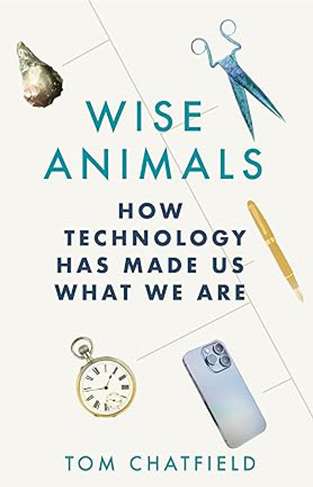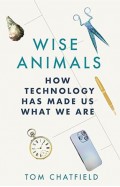Wise Animals
By: Tom Chatfield
-
Rs 3,865.50
- Rs 4,295.00
- 10%
You save Rs 429.50.
Due to constant currency fluctuation, prices are subject to change with or without notice.
'Powerful, profound and completely engrossing, this is a multitudinous meditation on not only technology but also history, culture, ideas, ethics, psychology and, above all, what it means to be human.' – Michael Bhaskar, co-author of The Coming Wave
Wise Animals explores the history of our relationship with technology, and our deep involvement with our creations from the first use of tools and the taming of fire, via the invention of reading and printing, to the development of the computer, the creation of the internet and the emergence of AI.
Human children know no more of modern technology than their ancestors did of older technologies thousands of years ago, and develop in relation to the technologies of their time. We co-evolve with technology as individuals as we have as a species over thousands of years.
Rather than see technology as a threat, this deeply humanist contribution to the debate proposes that we are neither masters nor victims of our technologies. They are part of who we are, and our future – and theirs – is in our hands.
'Powerful, profound and completely engrossing, this is a multitudinous meditation on not only technology but also history, culture, ideas, ethics, psychology and, above all, what it means to be human.' – Michael Bhaskar, co-author of The Coming Wave
Wise Animals explores the history of our relationship with technology, and our deep involvement with our creations from the first use of tools and the taming of fire, via the invention of reading and printing, to the development of the computer, the creation of the internet and the emergence of AI.
Human children know no more of modern technology than their ancestors did of older technologies thousands of years ago, and develop in relation to the technologies of their time. We co-evolve with technology as individuals as we have as a species over thousands of years.
Rather than see technology as a threat, this deeply humanist contribution to the debate proposes that we are neither masters nor victims of our technologies. They are part of who we are, and our future – and theirs – is in our hands.
Zubin Mehta: A Musical Journey (An Authorized Biography)
By: VOID - Bakhtiar K. Dadabhoy
Rs 892.50 Rs 1,050.00 Ex Tax :Rs 892.50
The Origins of Political Order From Prehuman Times to the French RevolutioN
By: Francis Fukuyama
Rs 4,045.50 Rs 4,495.00 Ex Tax :Rs 4,045.50
Manning Up: How the Rise of Women Has Turned Men into Boys
By: Kay Hymowitz
Rs 845.75 Rs 995.00 Ex Tax :Rs 845.75
The Obama Syndrome: Surrender At Home War Abroad
By: Tariq Ali
Rs 1,100.75 Rs 1,295.00 Ex Tax :Rs 1,100.75
The Quest For Meaning: Developing A Philosophy Of Pluralism
By: Tariq Ramadan
Rs 1,185.75 Rs 1,395.00 Ex Tax :Rs 1,185.75
The Pakistan US Conundrum Jihadists The Military And The People The Struggle For Control
By: Yunas Samad
Rs 1,185.75 Rs 1,395.00 Ex Tax :Rs 1,185.75
An Enemy We Created: The Myth Of The Taliban Al Qaeda Merger In Afghanistan 19702010
By: Alex Strick van Linschoten
Rs 4,197.50 Rs 8,395.00 Ex Tax :Rs 4,197.50
WikiLeaks: Inside Julian Assanges War on Secrecy
By: David Leigh & Luke Harding
Rs 637.50 Rs 850.00 Ex Tax :Rs 637.50
No similar books from this author available at the moment.
No recently viewed books available at the moment.
Zubin Mehta: A Musical Journey (An Authorized Biography)
By: VOID - Bakhtiar K. Dadabhoy
Rs 892.50 Rs 1,050.00 Ex Tax :Rs 892.50














-120x187.jpg?q6)





-120x187.jpg?q6)



-120x187.jpg?q6)



